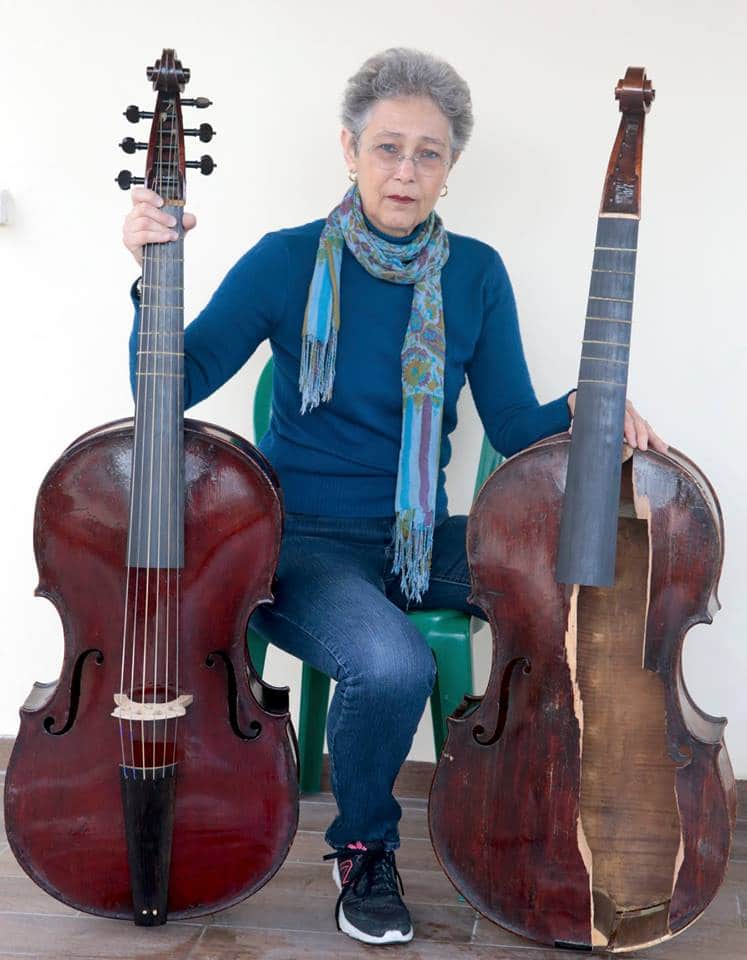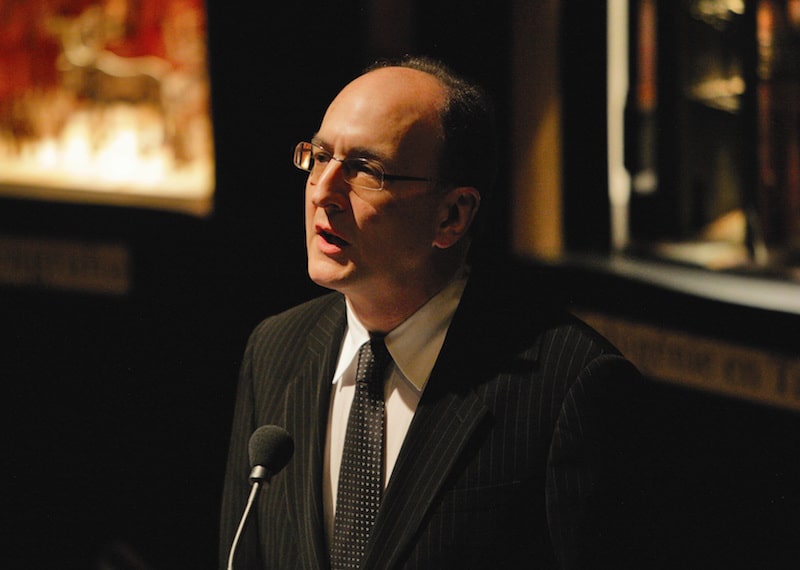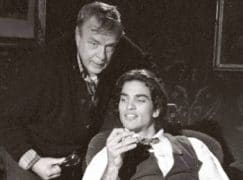Alitalia has hedged and fudged its responsibility for damage caused to an historic instrument. Its owner, Myrna Herzog, now sets out the whole story of the viola da gamba, and its future:

Before answering the many questions, I wish to heartily thank all the amazing, outstanding people from different parts of the world who generously offered support and help, with concern and empathy. I would like also to stress that no unfortunate event will ever change my great love and admiration for Italy, its people, culture, and music.
First question: can the Lewis viol be repaired? Yes, it can, and with luck it will be singing again in next season’s concerts, marking 20 years of the Israeli PHOENIX ensemble.
Second question: is the Lewis really a viol  (= viola da gamba)? Yes, it is. Since 1994 I have been writing articles on the subject of viols with violin/cello features (like the Lewis), that were published in the Grove’s Dictionary of Music and Musicians (Quinton entry), Early Music (cover article of the Feb 2000 issue), the Journals of the British and the American Viola da Gamba Societies, and of the Galpin Society, and in the book The Italian Viola da gamba. I also wrote a doctorate thesis on the subject which aims to enable the location and restoration of instruments like the Lewis, that have been transformed into celli due to their cello-like features.
(= viola da gamba)? Yes, it is. Since 1994 I have been writing articles on the subject of viols with violin/cello features (like the Lewis), that were published in the Grove’s Dictionary of Music and Musicians (Quinton entry), Early Music (cover article of the Feb 2000 issue), the Journals of the British and the American Viola da Gamba Societies, and of the Galpin Society, and in the book The Italian Viola da gamba. I also wrote a doctorate thesis on the subject which aims to enable the location and restoration of instruments like the Lewis, that have been transformed into celli due to their cello-like features.
Third question: are there 2 Lewis viols? Yes. The viol which was broken is one of 2 twin viols made by Edward Lewis, which my husband Eliahu Feldman and I have located, identified, bought and restored over the span of 15 years. According to the dendrochronology made by John Topham, the two viols were cut from the same tree around 1661/2, as was another extant Lewis viol (in the usual viol shape).
Fourth question: do these viols belong to any institution? No, they were bought privately by my husband Eliahu Feldman and myself over the years, restored and maintained with our own resources.
Regarding the Alitalia event:
Fifth question: when, and how did Lewis viol get to Brazil?
Seven years ago, shortly after its restoration, I took it to my native-town Rio, which I visited twice a year to see and play for my elderly parents. The viol got there through El-Al (flight from Israel) and then one of its partners (from Europe to Brazil), taken by hand to the hold at the check-in in Israel (where its Gewa hard case got 4 “fragile” red stickers) and arrived safely to Rio, where it has been since then.
Sixth question: why was the viol taken from Brazil to Israel? With the death of my parents, I decided to bring Lewis II home to join Lewis I for recordings and concerts.
Seventh question: why didn’t I in the first place buy a seat for the viol? Because of my previous experiences of flying with viols. During 48 years of professional life, I made many flights with viols, which were accommodated in the wardrobe of the plane or taken by hand to the hold. Only once I had a problem when transporting a cello, but it had nothing to do with being put in the hold. After my viol arrived in delay after some concerts in Germany 10 years ago, I established a norm for performing trips, that the people who hire me pay an extra ticket for the viol or provide a local instrument for me to play, to fear that the instrument would not arrive on time. My last flight with a viol dissociated from performance had been the one bringing the Lewis to Rio.
Eight question: are there airline guidelines for those carrying big instruments in the hold? Yes, and I followed British Airways’ ones to “carry your musical instrument in a hard case and ensure you are properly insured” and arrive early at check-in (I arrived 3 hours before the flight). In addition, I removed from the viol all the items which could cause internal damage in case of a fall: sound-post, bridge, tailpiece, strings, pegs.
The hard case I used to and from Rio was a reliable German Gewa (bearing four Fragile stickers). The Gewa company wrote to me regarding the damage made to instrument and case on Alitalia flights AZ673 and AZ806: “that’s really something what I never seen in such a damage kind like the shocking photos. The fiber from this case is really strong, to destroy it that must be one extremely pressure and impact on this case. We travel very often with our cello cases by plane, always by oversize luggage, but never happened something like this.”
Ninth question: what happened at the Alitalia check-in in Rio? Alitalia claims that “Our representatives at check-in in Rio airport advised to buy an “extra seat” to guarantee the safe carriage of the instrument but this solution was not accepted by you.” This is NOT TRUE. What happened was the opposite: when I asked to take the instrument inside the cabin, they told me that the plane was full and even if I wanted, I could NOT buy an extra seat. And they told me not to worry, the instrument would be carried BY HAND into the plane.
Would Alitalia have warned me of any danger, and offered me the possibility to buy a seat for the viol, I would have done it without hesitation. They gave me a paper to sign acknowledging that my instrument was too big to be accepted in the cabin. This is NOT A PERMIT TO BREAK IT into pieces. Nothing in the world justifies handling of a fragile thing – bearing at least four big red fragile stickers – with such violence.
Tenth question: what happened at the final destination, Tel Aviv? As the viol was not brought and did not appear in the odd size section, I addressed the Lost & Found desk in order to locate my instrument. The clerk went to look for the instrument, and got back empty-handed saying that it had arrived broken, and that I had to fill a form. After I filled the form, they brought it, and the sight was shocking. The instrument, bow and hard case had been violently broken and the instrument was in pieces. No hard case would have resisted to what it was submitted, as if it had been run over and crushed by a heavy vehicle.
Eleventh question: what has been Alitalia’s attitude? Until now, Alitalia never bothered to give me a phone call. No human voice, no human contact. After four days they sent me a letter through my travel agent, saying: “We would like to express our deepest regret for the INCONVENIENCE you experienced while traveling on Alitalia flights AZ673 and AZ806 last January 2 from Rio de Janeiro to Tel Aviv.” They propose to give me a compensation according to the Montreal Convention – which does not cover even the cost of the instrument’s case.
Should we musicians really be obliged to pay for extra seats for our big instruments or should airlines consider that we exist and have special problems? Why can’t cellos and viols be stored inside the plane, in the same closet that stores the manual folding wheelchairs? Why can’t cellos, viols, guitars be handed at the door of the plane (to be taken straight down to the hold making them far less likely to be damaged), and returned at the door after landing, exactly like baby strollers?
Fellow musicians in the world, we should NOT accept the present draconian rules that scorn our professional necessities. The younger musicians do not have even a clue of what kind of treatment was dispensed to us in the past. They think it is normal that airlines treat instruments worst than suitcases (mine, by the way, arrived unscathed!). But it is NOT normal. It is our duty to demand a change in this one-sided policy. For things are getting worse all the time, and nowadays, even violin cases are being rejected into the cabin of the planes. Yoyo Ma, Steven Isserlis, Jordi Savall, maybe you can help us out?
The beleaguered general manager of the Metropolitan Opera – falling attendances, low donations – has given an interview to a Russian journalist in which he claims credit for eleven years of unfaltering success.
Sample:
Many years ago I worked with Sony Music. And one day in Hollywood I met with the head of Sony Pictures. And they had before this several cash failures in a row. And he then told me that now we have a new policy in the company – no longer making films with a sad ending.
In my opinion, this is an example of how absurd it is to go in pursuit of commercial success. I think the responsibility of the theater is not only to arouse the desire of the public to be surprised, but also to stimulate its interest in learning.
The main thing is to give the viewer not what he thinks he wants to get, but what he does not realise he needs. Ultimately he will like it (Google Translate).
And one more:
When I became general manager of the “Met”, I immediately told the Board of Trustees that I would not execute their orders for performances. And so far I’ve never performed them. The board has the right to support my activities or to fire me. But I do not accept creative instructions from them.
As for the business and finance of the theater, then, of course, I must prove to the board that I will bear financial responsibility. But for the “Met”, in my opinion, it would be much more dangerous for the board to have the right to make artistic decisions.
If you recall the story of “Met”, the person in my post has always been a strong artistic leader. Although there were sad, instructive exceptions.

Full interview here (in Russian).
The actor Johnathon Schaech has written an account in People magazine of how the Italian director, who cast him in Storia di una capinera (Sparrow) in 1992, came on to him while they were making the film. Schaech was 22 at the time, Zeffirelli around 60.
This is as bad as it got:
One night, I think it was when we were at a hotel in Sicily and my costar wasn’t there, he told me he was coming to my room. This time he had managed to get a key. I was in bed sleeping and he let himself into the bedroom and he got beside my bed and was over the top of me on the side of the bed as I awoke. He got in my face. There was a moment where I was telling him “No” and he told me, “We have to.” I remember his breath smelling of scotch. And this is the whole thing, and you hear it from the women who are opening up now about their own experiences with abuse: There’s a moment where, even though you are taught to be charming and have sex appeal as an actor, a line is crossed and everything changes. When someone crosses that line, when someone preys on you, there’s a panic that sets in. That’s what Franco did. He crossed that boundary and I felt as though I left my body. He molested me in my bed. He put his hands in places that I couldn’t even imagine and he did things that I am not proud of. But it’s not my fault. His pants never came off but I can [still] see him fumbling with his belt. He attempted to give me oral sex. I just remember being like, “God, please no. I’m OK, I’m OK.” I did nothing. I just lay there in bed. It felt like four hours but it was probably like 30 seconds.
Read on here.
Zeffirelli, who is 94, has made no comment.

photo: People.com






